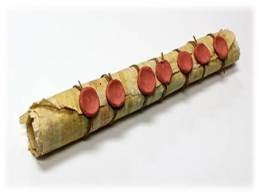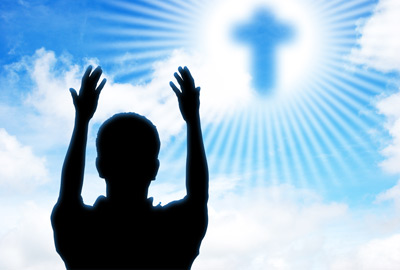Revelation 5 is a text which causes all creation to fall down in worship. Needs to be entered into with a great expectation, wonder and anticipation.
In part 5 we went through an open door into the heavenlies and we saw a throne. We saw God on the throne and the response of those around the throne.
In this part we move from the throne, which is the key symbol of (or furniture in) the book of Revelation, to Revelation's central figure. We are still in the Heavenlies, chapters 4 and 5 need to be seen together.
Now we see a seven sealed scroll held in the right hand of him who is on the throne - God himself.
 In Roman times (when book of Revelation written) a recognised method of registering a will was for it to be signed and sealed by the heir, executor and (typically) 5 witnesses - that gives us 7 seals, so this scroll would be recognisable to the original recipients of Revelation as a will (i). To make the inheritance official the heir, the executor and a majority of the witnesses had to be present when it was opened. This scroll is the Will and Testament of God the Father. The lamb steps forward and proceeds to open all seven of the seals, he is the heir and executor of the will, he is also the 5 witnesses. The Will of God the Father was written before anyone else was around, so there had been no one else to witness it. We see in visionary form what other Scriptures also tell us. The Father’s plan was made before creation and the Son will inherit everything. (Adapted from this article.)
In Roman times (when book of Revelation written) a recognised method of registering a will was for it to be signed and sealed by the heir, executor and (typically) 5 witnesses - that gives us 7 seals, so this scroll would be recognisable to the original recipients of Revelation as a will (i). To make the inheritance official the heir, the executor and a majority of the witnesses had to be present when it was opened. This scroll is the Will and Testament of God the Father. The lamb steps forward and proceeds to open all seven of the seals, he is the heir and executor of the will, he is also the 5 witnesses. The Will of God the Father was written before anyone else was around, so there had been no one else to witness it. We see in visionary form what other Scriptures also tell us. The Father’s plan was made before creation and the Son will inherit everything. (Adapted from this article.)
Revelation is a book of symbols.
The scroll contains God's plans for bringing the original purpose of creation to fulfillment. In basic terms the scroll contains the eternal decrees of God. More particularly the scroll contains God's purposes, plans, blessings and God's judgements. As a result this is a scroll of unparalleled importance.
The importance of the scroll can be seen in a number of ways.
- It is being held by God himself. It's God's scroll, held in his right hand, the hand of authority.
- It is written on both sides, not common practice at the time.
This shows us it is full, filled to overflowing, and not to be added to (Deuteronomy 4:2, Revelation 22:18-19). - It is sealed with seven seals, meaning it is perfectly and completely sealed.
- None is deemed worthy to open the scroll.
- John wept (wept, wept loudly) when he realised its importance.
Did he overreact? He realised that the Cosmos does not have a champion.
Chapter 5 does not end with verse 4 because this would be our plight.
Weeping, weeping, weeping & loudly because we need a champion.
Verse 5 is fantastic news for those who, like John, have a good working knowledge of what we call the old testament, or what he would have called "the scriptures".
The Lion of the tribe of Judah is the victorious and strong Messiah. Lions are the king of the beasts, lions rule, lions roar, lions devour things. Lions rule - other animals scatter.
The Messiah would come through the tribe of Judah - specifically through David.
David had songs written about him overcoming his enemies. Weep no more.
That's what John heard, verse 6 continues with what John saw.
John did not see a lion, he saw a lamb and a slain lamb at that!
A lamb that had been slaughtered, butchered, killed by force - forceable & horrible death.
Verses 6 and 7 contain the most important doctrine of the Christian faith.
It is the story of a lamb coming to do a lions work.
Revelation's central figure - the slain lamb of God.
There are 4 things here we can recognise about the slain lamb of God.
- The worthiness of the lamb. Notice where he stands - in close proximity to the throne.
He has seven horns - perfect power and perfect strength.
He has seven eyes - perfect wisdom, perfect knowledge.
He takes (is given) the Father's scroll.
He was slain (verses 8-10) - not rank or place, but because of his blood (Exodus 12, John 1:29, Isaiah 53).
He is standing - he did not stay in the grave. - The weakness of the lamb. A chosen weakness. A lion who chose to be a lamb (John 10:18).
This display of weakness is the ultimate display of power (not absence of).
Perfect power exhibited in perfect weakness. Jesus was silent, allowed himself to be devoured.
David killed his multitudes, Jesus raised up in front of them.
"Forgive them" or "crucify him" - which is the greater display of power? Divine power displayed in silence.
Why this way? Displays God's contempt for the world's power and wisdom.
The foolishness of God is stronger than the wisdom of the god of this age. Satan destroyed by a slain lamb.
Reminder to original recipients - God's way is not the way of the Romans. - The way of the lamb - sounds good so far, but we start to resist here, it's to be also our way (weakness).
We don't like "thorns in the flesh".
Can we receive the same answer Paul was given? His power made perfect in our weakness.
Can we boast in his power? Am I willing to live in weakness for the sake of Christ?
We have the treasure of knowing Jesus - he keeps it in us (jars of clay) so we depend on him.
This is not a life of resignation but a life of reliance on one who is greater
Entrusting ourselves to him who judges justly (1Peter 2:23) speaks of a betrayal.
We betray ourselves and give ourselves to someone else.
We deny ourselves - I am not going to trust myself, I am going to trust him.
The only way we can live in weakness.
Its not a life of defeatism, it is a life of entrustment.
This should change how we look at sickness, old age, disability, poverty, singleness, isolation, beauty.
Not a life of resignation or defeat. - The worship of the lamb. Worship redirected from the Father to the Son.
Revelation 4 Old Testament scene of worship, Revelation 5 New Testament scene of worship.
Rev 5:13 both are worshiped together.
Rev 5:8b our worship here and now is connected with the worship in Heaven.
Finally we see that our reign has begun if we are a follower of Jesus.
We are a kingdom of priests now (Rev 5:10) - both present and future.
Showing power of God in weakness, we are conduits of grace.
There is no crying in Heaven, no more tears, weep no more, because the Lion chose weakness.
Will I follow in his way? Will I worship him?
Do I live by faith or live by fear (fear is the opposite of faith).
1 John 4:18 There is no fear in love. Love drives out fear.
Matthew 11:30 Jesus's yoke is easy, his burden light - he provides a place of rest.
Further Reading
Ezekiel 2:9-10
Isaiah 11:1-10; Romans 15:12
John 1:29
1 Peter 1:19
Daniel 7
Psalm 150
Hebrews 6:13 - No-one greater to swear by.
References
(i) E. Randolph Richards, “Scrolls, Books and Seals,” The Biblical Illustrator (Summer 2015): 90-92.
